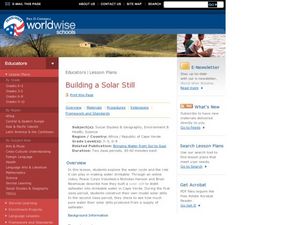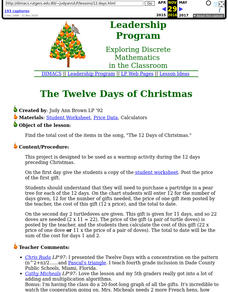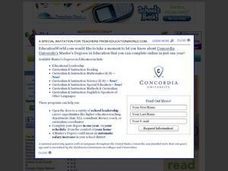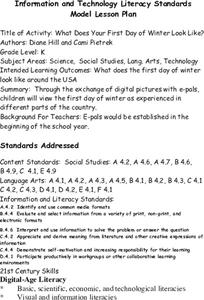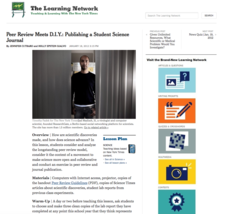Curated OER
Bringing Water to a Village in Lesotho
Students research water in Lesotho. In this water lesson, students watch videos showing how water comes to Lesotho Africa, they will compare this to how water is acquired in the US. Students will then create a mobile showing the...
Curated OER
Building A Solar Still
Students investigate the water cycle by viewing an online video. In this drinking water lesson, students create solar stills at their campus in order to purify water that is tainted. Students view a video on their computers about...
Curated OER
Pen and Ink Drawing
Learners hone their drawing techniques to create a nature-inspired piece of art. They practice hatching, cross hatching, stippling, and shading. They discuss how each method is better suited for creating specific elements in nature such...
Beyond Benign
PPM
The 15th lesson in the series of 24 helps your classes understand the ppm (part per million) unit of measure. First, scholars experiment with food coloring to determine concentrations before applying their findings to calculate...
Poetry4kids
How to Write Funny Poetry — Chapter 3: Choosing a Topic
Nothing's better than a really funny poem! Help young writers craft their funny poems with a lesson on one of the most challenging parts of writing: picking what to write about.
Curated OER
Writing Novelettes
Students practice their writing techniques by creating a novelette. In this creating writing instructional activity, students brainstorm and decide on a topic they would like to expand upon in order to create their own novelette....
Curated OER
Introduction to the Civilization of Ancient Greece
Students explore Greece. In this introduction to ancient Greece instructional activity, students locate and circle the names of the bodies of water surrounding Greece, then underline the names of important cities in Greece on a world map...
Curated OER
* Educators * Lesson Plans The Importance of Speaking Another Language
Young scholars examine the importance of speaking more than one language. They read and discuss an account written by a Peace Corps teacher in Ukraine, answer discussion questions, and discuss why English is taught in Ukraine.
Curated OER
ADULT ESOL LESSON PLAN--Level 2--Time and Money
Pupils practice identifying the parts of a calendar including its weeks and months of the year. They have an extensive vocabulary list to assist them as well. In addition, they complete an independent practice activity sheet.
Curated OER
Leadership Program in Discrete Mathematics
Students find the total cost of the items in the song, "The 12 Days of Christmas."
Curated OER
15 Relays for Field Days
Young scholars, in teams, participate in a variety of fun themed relay races.
Curated OER
Alliance to Save Energy's Green Schools Program
First graders, in groups, discover which colors absorb heat and which colors best reflect heat. They do this using the scientific method.
Curated OER
You Can't Go Wrong with a Right Triangle 2
Upper graders use the properties of right angle trignonmetry to measure objects such as the school flagpole. They solve real world problems using these properties.
Curated OER
Friday Forum (Day 4)
Have your young speakers participate in a discussion/debate with their whole class on their prepared argument. They listen and analyze other student's arguments and refute arguments using logic and not emotion.
Curated OER
Introduction to Bacteria
Beginning biologists survey several websites to learn about the types, structure, motility, feeding habits, and reproductive methods of bacteria. All websites are linked to the lesson plan, so you can have individuals access it and click...
Curated OER
What Does Your First Day of Winter Look Like?
Students brainstorm the characteristics of winter. Using an email program, they share their characteristics of winter with those in another part of the country. They compare and contrast each letter they receive with their own criteria...
Curated OER
Clifford Goes to School and So Do We!
Students create a Clifford headband and make a sign in the shape of a large bone that includes four rules on it as included in the lesson. They follow step-by-step directions, identify the four classroom rules, and respond that rules are...
Curated OER
Fossil Fuels (Part II), The Geology of Oil
More of a mini-unit than a lesson, these activities lead inquisitors through a survey of oil deposits. In the first part, they read about and view diagrams of sedimentary rock layers that trap oil. Next, they test porosity and...
Curated OER
Encourage A New Generation of Peacemakers
Integrate this essay-writing contest into your high school classroom to develop writing skills and encourage international study.
Curated OER
First Grade, First Grade, What Do You See?
First graders read the book "Brown Bear, Brown Bear, What do you see?" by Bill Martin, Jr. and work cooperatively to create an online book about their geographic region. Books can be posted on the internet with other books from around...
Curated OER
Impulse, Momentum, and the Conservation of Momentum
What happens when two worlds collide? In the first of several activities, future physicists experiment with colliding ball bearings or Newton's cradle. Another activity requires the use of an air track with cars to examine collision....
Astronomical Society of the Pacific
Getting Ready for the All American Eclipse!
Give your pupils a front row seat at the biggest light show in the sky this year! In addition to admiring the total solar eclipse, young astronomers can explain the phenomenon with a little help from an inquiry-based lesson. The focus of...
Curated OER
Expressing Your Views to the Letter
Analyze the motivation, purpose, and value of letters to the editor by examining letters written in response to the violence at Columbine High School. For homework, middle and high schoolers write their own letters to the editor about an...
Curated OER
Peer Review Meets D.I.Y.: Publishing a Student Science Journal
Peer review of science laboratory reports? You bet! First, learners work in pairs to review a scientific article. Then they trade lab reports for peer review. The end result is the publication of a classroom scientific journal!



